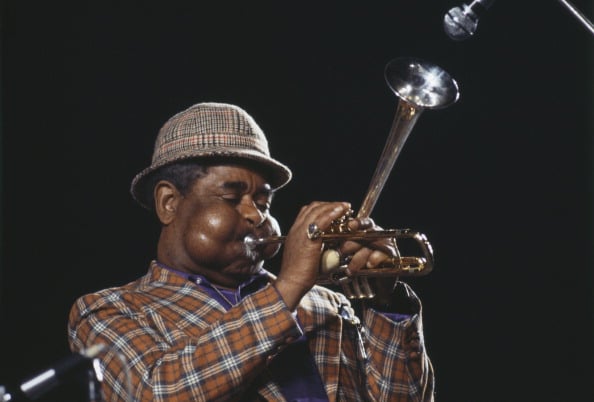What was Dizzy Gillespie's net worth?
Dizzy Gillespie was an American jazz trumpeter, bandleader, composer, singer, and educator who had a net worth of $4 million at the time of his death in 1993. After adjusting for inflation, that's the same as around $8 million today.
Dizzy Gillespie was one of the most innovative and influential jazz musicians of the 20th century. A virtuoso trumpeter, composer, bandleader, and all-around entertainer, Gillespie helped pioneer the bebop movement of the 1940s alongside Charlie Parker, revolutionizing the harmonic and rhythmic language of jazz. With his bent trumpet, puffed cheeks, and mischievous grin, he became one of the most recognizable faces in music. But beyond the image was a serious and groundbreaking artist whose contributions to Afro-Cuban jazz and modern improvisation reshaped American music forever. Gillespie's career spanned over five decades, during which he collaborated with some of the greatest names in jazz, formed influential big bands, and remained an outspoken ambassador for the music he loved.
Early Life and Musical Roots
John Birks Gillespie was born on October 21, 1917, in Cheraw, South Carolina. The youngest of nine children, he began playing piano at age four and later taught himself trumpet and trombone. By the time he was a teenager, his talent was evident, and he earned a scholarship to the Laurinburg Institute in North Carolina.
In the mid-1930s, Gillespie moved to Philadelphia, and then to New York City, where he landed a spot in the Teddy Hill Orchestra. It was during this period that he earned the nickname "Dizzy" for his energetic stage presence and unpredictable sense of humor. Early stints with Cab Calloway, Ella Fitzgerald, and other big band leaders gave Gillespie valuable experience and exposure.
Bebop and Musical Innovation
In the early 1940s, Gillespie joined forces with saxophonist Charlie Parker, and together they pioneered a radical new form of jazz that came to be known as bebop. Characterized by fast tempos, complex chord changes, and intricate improvisation, bebop was a dramatic departure from the dance-oriented swing music of the era. Gillespie's advanced harmonic sensibility and virtuosic trumpet technique made him one of the movement's leading figures.
In addition to Parker, Gillespie worked with other bebop pioneers like Thelonious Monk, Kenny Clarke, and Bud Powell. He also composed a number of enduring jazz standards during this period, including "A Night in Tunisia," "Groovin' High," "Salt Peanuts," and "Woody 'n You."

(Photo by David Redfern/Redferns/Getty)
Afro-Cuban Jazz and Big Bands
Gillespie was also instrumental in the development of Afro-Cuban or Latin jazz. In the late 1940s, he collaborated with Cuban percussionist Chano Pozo, blending bebop with Afro-Cuban rhythms to create a fresh and vibrant sound. Their joint compositions, such as "Manteca" and "Tin Tin Deo," helped popularize the genre and expanded jazz's global reach.
Throughout his career, Gillespie led a number of big bands, notable not only for their musicianship but for their adventurous repertoire. His 1947 big band brought bebop to a larger audience and introduced audiences to future jazz stars like John Coltrane and James Moody. Later ensembles featured electric bass, electric piano, and other modern elements, showing Gillespie's continued willingness to evolve with the times.
Later Career and Legacy
By the 1950s and 1960s, Gillespie had become a global jazz ambassador. He toured extensively under the U.S. State Department's cultural diplomacy programs, performing in Europe, the Middle East, Africa, and South America. He remained a vital figure in jazz for decades, performing at major festivals, recording prolifically, and mentoring younger musicians.
In 1979, he received a Grammy Lifetime Achievement Award. In 1989, he was awarded the National Medal of Arts, and in 1990 he was named a Kennedy Center Honoree. Despite declining health in the early 1990s, Gillespie continued to perform and remained a vibrant presence in the jazz world until his death on January 6, 1993.
/2020/11/Dizzy-Gillespie.jpg)
/2013/08/Chuck-Mangione.jpg)
/2019/02/Sonny-Rollins.jpg)
/2019/06/John-Coltrane.jpg)
/2015/01/GettyImages-51503550.jpg)
/2014/08/GettyImages-469147872.jpg)
/2019/10/denzel-washington-1.jpg)
/2020/02/Angelina-Jolie.png)
:strip_exif()/2015/09/GettyImages-476575299.jpg)
/2017/02/GettyImages-528215436.jpg)
/2020/01/lopez3.jpg)
:strip_exif()/2009/09/P-Diddy.jpg)
/2009/11/George-Clooney.jpg)
/2019/04/rr.jpg)
/2009/09/Jennifer-Aniston.jpg)
/2009/09/Cristiano-Ronaldo.jpg)
/2018/03/GettyImages-821622848.jpg)
/2020/11/Dizzy-Gillespie.jpg)
/2014/08/GettyImages-469147872.jpg)
/2013/08/Chuck-Mangione.jpg)
/2015/01/GettyImages-51503550.jpg)
/2010/08/herbie-hancock-1.jpg)
/2019/06/John-Coltrane.jpg)
/2014/06/GettyImages-652335363.jpg)
/2014/07/GettyImages-910804340.jpg)
/2019/11/GettyImages-1094653148.jpg)
/2020/06/taylor.png)
/2020/04/Megan-Fox.jpg)